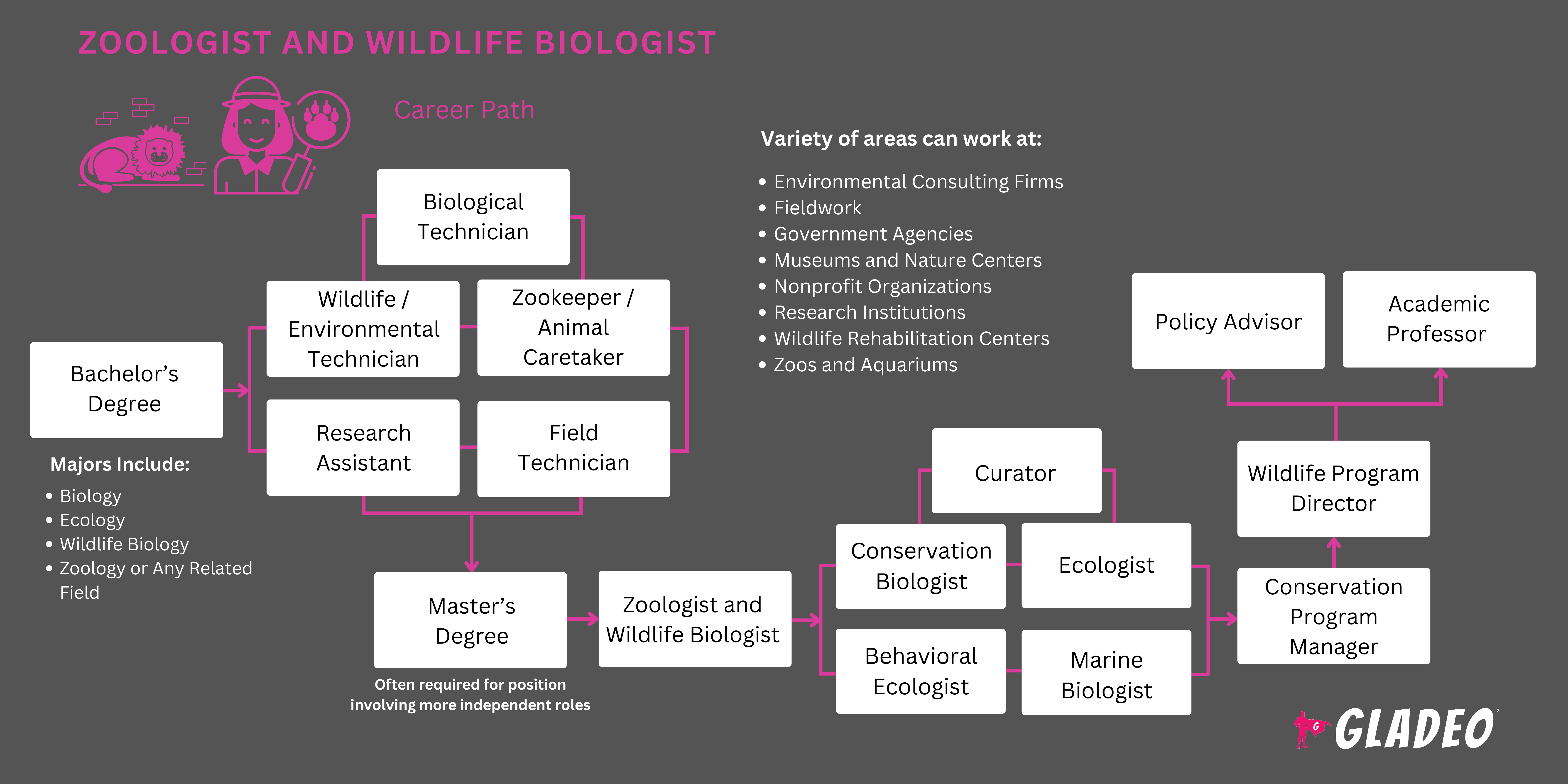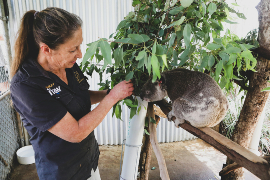Spotlights
Aquatic Biologist, Conservation Biologist, Fish and Wildlife Biologist, Fisheries and Wildlife Biological Scientist, Fisheries Biologist, Forest Wildlife Biologist, Habitat Biologist, Wildlife Biologist, Wildlife Refuge Specialist, Zoologist
Wild animals and their habitats play a huge role in keeping our planet healthy—and Zoologists and Wildlife Biologists are the experts who study how these animals live, survive, and connect with the environment. They dig into animal behavior, habitats, and ecosystems to better understand what animals need to thrive.
These scientists spend time outdoors tracking animals, watching how they move and interact, or work in labs studying animal biology and genetics. They also help protect endangered species and restore natural habitats by using their research to shape conservation efforts and environmental policies.
From forests to wetlands to grasslands, Zoologists and Wildlife Biologists are on the front lines of wildlife protection, helping communities and governments make smart choices to preserve nature for the future. If you’re passionate about animals and want to make a real impact on protecting wildlife and their homes, this career is a perfect fit!
- Seeing animals thrive in restored or protected habitats.
- Discovering new species behaviors or migration patterns through field research.
- Working outdoors in some of the most breathtaking environments on Earth.
- Helping endangered species recover through conservation action.
- Knowing your work supports global biodiversity and ecosystem health.
Working Schedule
- Zoologists and wildlife biologists usually work full-time. Fieldwork may include early mornings, late evenings, or overnight stays to observe animals in their natural behavior cycles. Lab and office work often follows standard business hours. Travel is common for research, conservation projects, and conferences.
Typical Duties
- Observe and document animal behavior, health, and population trends.
- Collect samples (such as hair, feathers, or water) for lab analysis.
- Track animal movements using GPS collars, camera traps, or drones.
- Analyze data to understand species distribution and environmental impacts.
- Write scientific reports and present findings to agencies, NGOs, or the public.
- Develop and implement wildlife conservation and management plans.
Additional Responsibilities
- Collaborating with park rangers, conservation officers, and community stakeholders.
- Training interns, volunteers, or students on fieldwork techniques.
- Advising policymakers on habitat protection and wildlife laws.
- Monitoring the effects of human activities, pollution, or climate change on wildlife.
- Conducting public outreach and education programs to raise conservation awareness.
- Applying for research grants and managing project budgets.
- Participating in international conservation efforts and scientific collaborations.
A typical day for a zoologist or wildlife biologist often begins early. They may set up observation equipment or check tracking stations before sunrise when animals are most active. Field time involves watching, recording, and sometimes tagging animals for study.
Afternoons might be spent entering data into computer systems, analyzing results, and drafting reports. During certain seasons—like migration or breeding—they may camp in the field for days at a time.
As one wildlife biologist explains, “Every day is different. Some days I’m hiking through forests; other days, I’m deep in data. But every part of the work helps us protect these animals for future generations.”
Soft Skills:
- Observation and attention to detail
- Patience and perseverance
- Analytical thinking
- Clear communication and writing
- Collaboration and teamwork
- Problem-solving
- Physical stamina
- Cultural and ecological awareness
- Adaptability to outdoor conditions
Technical Skills:
- Wildlife tracking and tagging technologies (GPS, camera traps, drones)
- Statistical and ecological data analysis
- Laboratory techniques and field sampling methods
- Geographic Information Systems (GIS)
- Knowledge of wildlife biology, ecology, and environmental science
- Scientific report writing
- Conservation planning and policy knowledge
- Use of research software and databases
- Mammalogists: Focus on mammals like bears, bats, or elephants.
- Ornithologists: Specialize in birds and their habitats.
- Herpetologists: Study reptiles and amphibians.
- Entomologists: Research insects and their roles in ecosystems.
- Marine Biologists: Focus on ocean species and coastal ecosystems.
- Conservation Biologists: Work to protect endangered species and biodiversity.
- Behavioral Zoologists: Study animal communication, mating, and social behaviors.
- National parks and wildlife refuges
- Federal or state environmental agencies
- Conservation nonprofits and NGOs
- Zoos and aquariums
- Universities and research institutions
- Environmental consulting firms
- International conservation organizations
This career isn’t for those who want a predictable routine. Fieldwork can mean working in hot sun, heavy rain, mud, or freezing temperatures. You may spend long hours in remote areas with limited access to comfort.
Much of the work is driven by funding cycles, which means writing grant proposals and waiting for approvals. And sometimes, your research may not produce immediate results.
But the rewards are powerful—you’ll be helping protect species, restoring habitats, and contributing to science that matters.
The world of studying wildlife is changing fast as we face new challenges like habitat loss and climate change! Zoologists and Wildlife Biologists are now using high-tech tools like drones, GPS tracking, and even AI (Artificial Intelligence) to gather detailed information about animals and their environments. These technologies help scientists track animal movements, monitor populations, and predict how species will adapt in the future.
At the same time, there’s a growing push for wildlife conservation and protecting ecosystems, with people demanding more transparency about how animals and habitats are managed. Zoologists and Wildlife Biologists are key players in making sure conservation efforts meet these higher standards.
Sustainability is a big focus too—these scientists work on creating plans that protect wildlife while allowing humans to live and grow responsibly. If you’re excited by combining nature, technology, and science to help animals and the planet, this field is full of opportunities!
Many zoologists and wildlife biologists loved exploring nature, observing animals, bird-watching, or keeping pets. They often enjoyed science fairs, documentaries about wildlife, and spending time outdoors. Curiosity about how animals live and interact with their environment was a common trait.
According to career data, most Zoologists and Wildlife Biologists have at least a bachelor’s degree, with many pursuing advanced degrees to specialize. Common majors include zoology, wildlife biology, ecology, environmental science, and biology.
Important college courses often cover topics like:
- Animal Behavior and Physiology
- Ecology and Conservation Biology
- Wildlife Habitat Management
- Genetics and Evolution
- Geographic Information Systems (GIS)
- Environmental Law and Policy
- Field Research Methods
- Statistics and Data Analysis
Entry-level experience might come from internships, research assistant roles, or fieldwork positions. Typically, new professionals also spend several months to a year gaining on-the-job training to develop specific skills.
Certifications that can boost your career include:
- Wildlife Society’s Certified Wildlife Biologist (CWB)
- Society for Conservation Biology Membership and Training Programs
- GIS Certification from the GIS Certification Institute (GISP)
- Certified Ecologist through the Ecological Society of America
- Start preparing early by focusing on science and math courses in high school, such as biology, chemistry, physics, and environmental science. Strengthen your writing and presentation abilities because clear communication is essential for sharing research and findings.
- If available, take electives that touch on ecology, animal behavior, conservation, public policy, and computer skills like Geographic Information Systems (GIS), which is widely used in wildlife research.
- Learn as much as you can about the field—read job descriptions and career guides to understand specialties and daily tasks. Gain practical experience through internships, volunteer work, or summer programs related to wildlife conservation, research, or environmental protection.
- Get involved in school or community nature or environmental clubs and seek out opportunities to shadow professionals or conduct informational interviews with zoologists or wildlife biologists.
- Keep up with current issues affecting wildlife and ecosystems by following online environmental forums, blogs, or discussion groups to stay informed and inspired.
- Finally, document your academic achievements, extracurricular activities, and relevant experiences to build a strong resume for college and job applications.
- Strong fieldwork and lab research opportunities
- Partnerships with parks, zoos, or conservation organizations
- Access to internships and hands-on learning
- Courses in ecology, GIS, conservation, and research methods
Examples of Strong Programs:
- University of California, Davis – Wildlife, Fish, and Conservation Biology
- Colorado State University – Fish, Wildlife, and Conservation Biology
- University of Florida – Wildlife Ecology and Conservation
- Oregon State University – Fisheries, Wildlife, and Conservation Sciences

- Start by signing up for job alerts on popular job portals like Indeed, SimplyHired, Monster, USAJobs, and Glassdoor to catch relevant openings early. Build a LinkedIn profile and connect with professionals because networking is key—about 85% of jobs are found through connections.
- When reviewing job postings, look for keywords to include on your resume such as Wildlife Management, Ecology, GIS, Data Analysis, Conservation, Environmental Compliance, Animal Behavior, and Research Methods.
- Check out sample resumes and interview questions to prepare, focusing on topics like your strategies for animal conservation, experience with fieldwork or data collection, and how you communicate scientific findings to various audiences.
- Research potential employers thoroughly—their mission, projects, and values—and explore their career pages. Use your school’s career services for resume reviews, mock interviews, and job fairs.
- Seek internships, volunteer work, or research assistant roles to gain practical experience. Try to shadow or interview zoologists and wildlife biologists to get insider knowledge.
- Finally, dress professionally for interviews and ask previous professors or supervisors for recommendation letters or permission to use them as references.
- Let your supervisor know early on that you’re interested in growing your career and taking on more responsibility. Seek their advice on advancement options—there are many paths, including research, teaching, conservation management, and specialized fields within zoology and wildlife biology.
- Keep advancing your skills through continuing education, such as graduate degrees (Master’s or Ph.D.), which often open doors to leading research projects and higher-level positions. Acquire certifications like those from The Wildlife Society (Certified Wildlife Biologist) or GIS certifications to boost your credentials.
- Try to gain experience across various projects—field research, lab work, conservation programs—to build a strong, diverse skill set. Then consider focusing on a niche area like marine biology, endangered species management, or ecological policy.
- Stay active in professional organizations and networks to learn about industry trends, regulatory changes, and networking opportunities.
- Keep in mind that smaller organizations may offer fewer advancement opportunities, so you might need to consider changing employers or geographic locations to move up the ladder.
- Being proactive about your career development, staying current with scientific advancements, and building a strong professional reputation are key to climbing the ladder in this field.
Websites
- U.S. Fish and Wildlife Service
- The Wildlife Society
- National Park Service
- Conservation Job Board
- Nature.org (The Nature Conservancy)
- World Wildlife Fund Careers
- Conservation International
- Wildlife Conservation Society
- Audubon Society
- Defenders of Wildlife
- Sierra Club
- National Wildlife Federation
- EnvironmentalCareer.com
- EcoJobs.com
- GreenJobs.net
Books
- Wildlife Biology by Raymond F. Dasmann
- The Song of the Dodo by David Quammen
- Silent Spring by Rachel Carson
- Conservation Biology by Fred Van Dyke
If becoming a Zoologist or Wildlife Biologist isn’t the perfect fit, related paths let you work with nature and conservation in different ways:
- Park Ranger
- Environmental Educator
- Animal Trainer or Care Specialist
- Marine Technician
- Environmental Consultant
- Veterinary Technician
- Ecotourism Guide
- GIS Mapping Technician
Newsfeed

Featured Jobs

Online Courses and Tools







